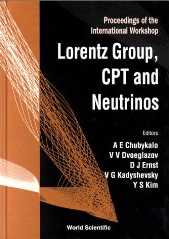
Buy Now
Pages: 466
Publisher: World Scientific Publishing Company
Year: 2001
ISBN: 9810240627
ISBN: 978-9810240622
The Lorentz Group, Cpt and Neutrinos: Proceedings of the International Workshop Zucatecas, Mexico 23-26 June 1999 (Buy Now)
Authors
-
 V. V. Dvoeglazov graduated from Saratov State University (ex-U.S.S.R.) in 1983. He earned his first doctorate degree (in Russia there are two doctorate degrees) at the JINR, Dubna (1991) with the thesis ?Description of the interactions of two relativistic particles with spins in the quantum field theory?. The degree was confirmed by the U.S.S.R. State Attestation Committee in April 1992. Since 1993 he has been working in Mexico, and since March 1994 at the Universidad Autonoma de Zacatecas, at University City in the central mountainous part of Mexico, where he is a member of the Mexican Sistema Nacional de Investigadores, Nivel I (Mexican System of National Researchers, Level I). He is the (co)author of approximately fifty (50) scientific publications and has made contributions to several dozen conferences at the national (Mexico), all-Union (ex-U.S.S.R.) and international levels. His main areas of research are the physics of neutral particles and the extended Poincar? group symmetries.
V. V. Dvoeglazov graduated from Saratov State University (ex-U.S.S.R.) in 1983. He earned his first doctorate degree (in Russia there are two doctorate degrees) at the JINR, Dubna (1991) with the thesis ?Description of the interactions of two relativistic particles with spins in the quantum field theory?. The degree was confirmed by the U.S.S.R. State Attestation Committee in April 1992. Since 1993 he has been working in Mexico, and since March 1994 at the Universidad Autonoma de Zacatecas, at University City in the central mountainous part of Mexico, where he is a member of the Mexican Sistema Nacional de Investigadores, Nivel I (Mexican System of National Researchers, Level I). He is the (co)author of approximately fifty (50) scientific publications and has made contributions to several dozen conferences at the national (Mexico), all-Union (ex-U.S.S.R.) and international levels. His main areas of research are the physics of neutral particles and the extended Poincar? group symmetries.Website http://cantera.reduaz.mx/~valeri/valeri.htm inoperable as of 8/08
-
 Professor of Physics(Electrodynamics, Iaad)
Professor of Physics(Electrodynamics, Iaad)Theoretical physicist, educator and researcher Andrew Evgenievich Chubyukalo was born in Polotsk, a small village in Bielorussia. He earned his MSc. in physics from the University of Kharkov, Ukraine, 1986, and his Ph.D. from the Institute of Monocrystals, Academy of Science, Ukraine in 1992, and was a postdoctoral fellow and research fellow at the Instituto de Ciencia de Materiales, Madrid, Spain from 1993 to 1995. He then moved to Mexico, where he has since been a Professor of Physics at the Universite Autonoma de Zacatecas. A member of the New York Academy of Sciences, his research interests include solid state theory and the classical theory of fields.
-


